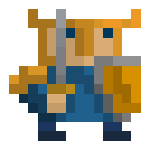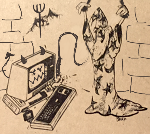|
Recently an old monitor of mine stopped working due to bad capacitors. Rather than buying a new one, I've decided to seize the opportunity to get into soldering and working with PCB. I've done some light soldering with circuitry before, but it's always been complete butchery due to me not having enough experience/knowledge or the right tools. -What do I need to do decent circuitry soldering? -How much should I expect to spend? -Are there any worthwhile all-in-one kits available? -What are some good resources for getting started? Any general advice is appreciated. Thanks. 
|
|
|
|

|
| # ? Apr 25, 2024 09:57 |
|
- Soldering station (not a Radioshack firestick!), solder (lead solder from China is easiest), flux pen, solder braid - How serious are you? For a decent soldering station that will allow you to do some fine-pitch surface mount stuff (eventually) and won't burn your house down, expect to spend >$50 A long favourite is the hakko fx-888d, but you might be able to find a knockoff, or a cheaper station. - Probably worth buying everything separately, there's not enough to gather to justify a markup - http://forums.somethingawful.com/showthread.php?threadid=2734977 Also youtube. Most people learn to solder through youtube now
|
|
|
|
The basics of soldering is that you don't want to use the iron to heat the solder. You should use the iron to heat the parts you want to join (i.e., a component's connecting wire, and the exposed metal on the circuit board), then touching the end of the solder wire to the heated parts, then removing both the solder wire and the iron. With sensitive electronics, you need to be decently fast about it because you don't want to heat a component's connecting wire long enough for the heat to travel up the wire and into the component itself, which can destroy sensitive parts. Also, since you mentioned a monitor, if it's a CRT be very careful because it can retain enough charge in the flyback circuitry to seriously injure you or kill you, even when it hasn't been plugged in for quite some time. YouTube has some good videos on discharging this sort of circuitry safely.
|
|
|
|
The previous poster is spot-on. The way I think about it is, I'm trying to drip solder onto the joint. I hold the iron above the joint (usually for me some component+PCB) and just lower down the solder onto the middle of the tip, not the very tip, but just slightly before it, like so. Have fun, be safe, and release the magic blue smoke!
|
|
|
|
Avoid lead free solder - its much easier to use a rosin cored lead solder. In most places you can still get lead solder for non-commercial use.
|
|
|
|
Hopefully you are talking about lcd or something, those old crts are really dangerous to take apart and that shouldn't be your introduction to circuitry! Another poster mentioned this but you need to be really careful with any consumer electronics you are taking apart.
|
|
|
|
I would highly suggest finding something else to practice on first. A.) you will probably gently caress up your first time soldering something like that and B.) you can hurt/kill yourself with the flyback transformer/capacitors if you don't know what you're doing there
|
|
|
|
Yeah, odds are you aren't going to do a good job on the first few things you solder. If you can find old/garbage electronics, I'd recommend practicing with something the size of a NES cartridge, or ISA cards. Anything will do really, but it's nice to start with big and forgiving contact areas so you can get the feel of the solder and how much to heat it. I'm not any good at it though, maybe you'll pick it up really quickly. Grab something like this, put solder on the big gold pins, then try taking off the black ICs.
Malcolm fucked around with this message at 05:19 on Feb 1, 2015 |
|
|
|
Thanks for all the information, everyone. I'm not working on a CRT, and I'll be careful to discharge the capacitors before I work on them. I purchased this soldering iron, a bunch of different sizes of 63/37 rosin core solder and little tools to help me along, as well as a starter project kit.
|
|
|
|
The Hakko 888 is a DREAM. Buy it if you plan to solder stuff.
|
|
|
|

|
| # ? Apr 25, 2024 09:57 |
|
If you eventually plan to repair something I'd suggest getting some soldering wick as mentioned earlier. It's basically a braid that sucks up the solder so you can take out components. You can practice on your practice board or another random electronic piece. I also find wire snips useful to trim leads after soldering and needle nose pliers (I prefer the bent kind) to bend/extract components.
|
|
|









